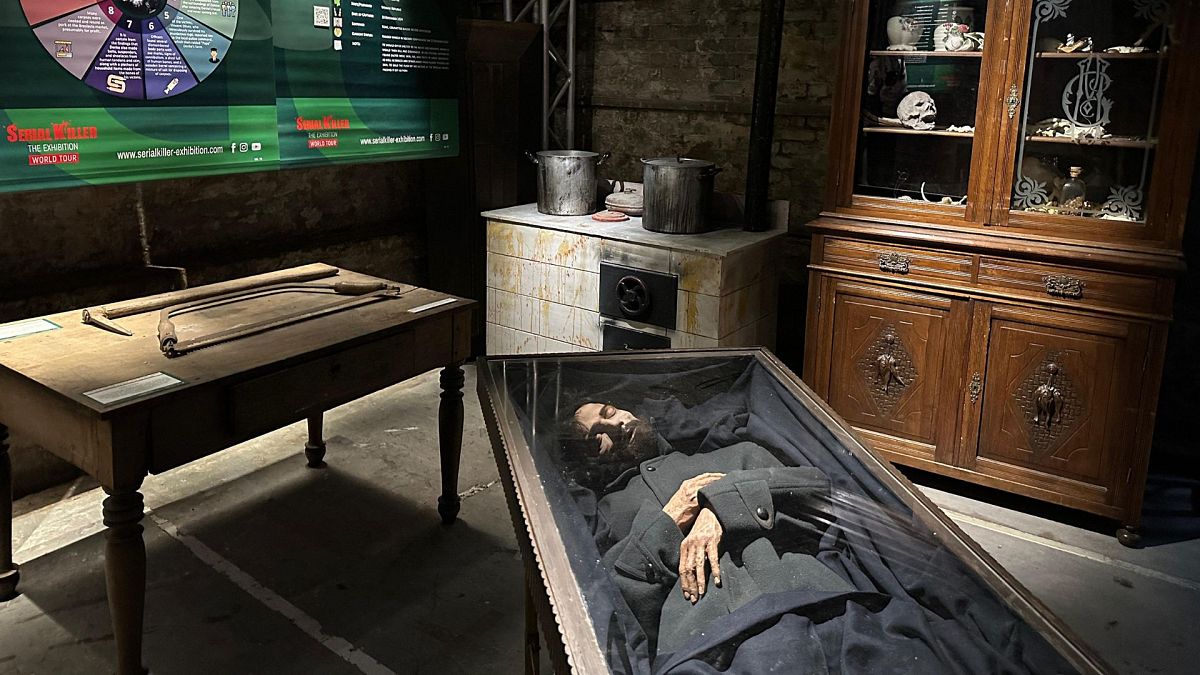London’s newest visitor attraction is a gore fest that revels in the murder and mayhem of serial killers.
Last week an exhibition opened in London that will definitely divide opinion, not only because of its provocative subject matter and graphic content, but for what it says about you, me, and us.
Titled “Serial Killer”, the extensive exhibition will either be seen as a thought-provoking investigation into the motivations and actions of some of humankind’s most brutal killers, or, a ghoulish celebration of the crimes of damaged and deranged individuals who brought untold terror and horror to families and communities.
All the big names are there: Charles Manson, Ted Bundy, Aileen Wuornos, Jeffrey Dahmer, Dennis Nilsen, and perhaps most disturbingly, English nurse Lucy Letby, who was convicted of murdering seven babies last year. Goodness only knows how the families of her victims feel about her being immortalised in this way.
Original artefacts, a lock of Bundy’s hair, Jeffrey Dahmer’s glasses, letters and artwork from prison cells, sit in glass cases – important relics that must be preserved and protected.
Reconstructions of murder scenes, complete with bloody mattresses, bodies wrapped in plastic bags, a fridge containing body parts, and the pots used to boil human remains, are presented for the viewing public.
Now, don’t get me wrong, I like a bit of true crime from time to time. I even made the effort to find out more about Ted Bundy’s crimes. The little I knew was that he was considered good-looking, intelligent, and educated enough to conduct his own trial defence – although he died in the electric chair in 1982, so maybe not that intelligent.
What I discovered disgusted me. He was a monster who terrorised, imprisoned, brutalised, murdered, and desecrated the bodies of his young female victims. Yet his good looks and articulation are the traits that have made him a star.
I vowed then to apply a simple rule to myself to ensure I never again slipped down the serial killer rabbit hole. The rule is quite simple: ‘Will knowing a single detail of these killers’ crimes or psychology enrich my life in any way?’
If the answer is yes, I’ll go for it. If no, then it stops.
Humanity’s most basic instincts are stimulated
“Serial Killer” is perhaps the nadir of the highly disturbing and highly popular true crime genre that dominates streaming platforms – not so much Netflix and chill, more Netflix and bone-chilling.
It’s riding the wave of an interest in true crime that has algorithms working overtime to give the people what they want. It appeals to humankind’s most basic instincts and packages those primal urges and fascinations as entertainment.
Amid the gore, the unsuspecting faces of victims and the macabre reconstructions of murder and burial sites are bright and there are colourful interactive games, which are designed to find out just how much of a psychopath you are (I’m 2% below the threshold), or test your knowledge of serial killers and their crimes.
One room features the depiction of serial killers in films: Freddy Krueger’s clawed glove from A Nightmare on Elm Street; the body armour worn by Julianne Moore in her stint as Clarice Starling in Hannibal, the sequel to The Silence of the Lambs; and Charlize Theron’s Oscar-winning performance as serial killer Aileen Wuornos in Monster.
This is pure entertainment that’s designed to get people through the door. And while there’s nothing wrong with that, it’s simply not for me.
Exhibit to be removed after concerns
Giancarlo Guerra, the Italian supervisor of the exhibition, told Euronews Culture that “Serial Killer” was ten years in the making, and it shows. Organisers estimate it will take more than an hour to view the 1,000-plus artefacts.
He also explained that time has been taken to ensure that the subject matter was handled sensitively and that victims and their families will benefit from the exhibition via a charity.
Guerra stressed that the majority of cases featured are more than 40 years old, so less likely to offend. That is apart from the Lucy Letby case, which, after careful consideration by curators, will be removed from the exhibition.
“Serial Killer” describes itself as showing the phenomenon of serial killers from a historical, educational, and scientific point of view. This it does, as investigative and forensic techniques are featured – from the 19th century to the sophisticated criminal profiling of today. But who’s reading the investigative techniques info when to your left are severed limbs and a bath stained with a victim’s blood, and to your right an arsenal of murder weapons?
“Serial Killer” is exactly what it says on the can: a graphic, no-holds-barred exploration of some of the most horrific serial killers of all time in forensic and theatrical detail. No surprise then to learn that it didn’t pass my test.
“Serial Killer: The Exhibition” runs until 5 January 2025 at The Vaults in London. Check out the video above for footage of the exhibition and our interview with the exhibition supervisor.

